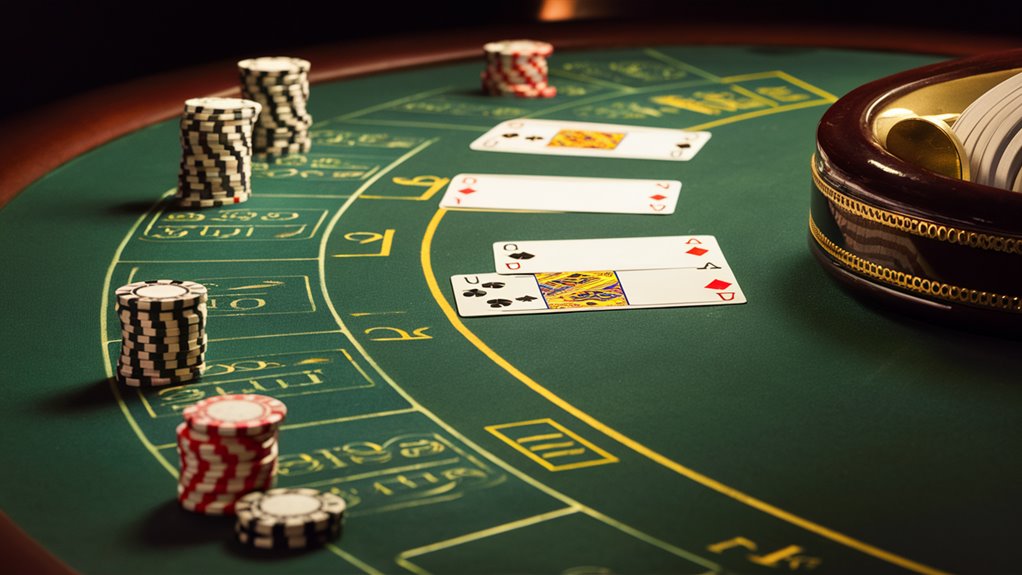How Do I Know It Is Time to Stop Gambling?
Some warning signs of a problem gambler include:
Some behaviors of problem gamblers are noticeably unusual, you can’t just ignore the red flags. Merely questioning your gambling habits indicates that you need to examine your relationship with betting. Major warning signs include:
Using essential money, like rent or bill funds, for gambling.
Deceiving others about gambling activity and costs.
“Chase reading,” or repeatedly betting in an attempt to recoup losses.
Feeling withdrawal symptoms when unable to bet.
Financial and Emotional Impacts
Problem gambling is often reflected through different channels:
But the signs can be extremely subtle. Warning signals are less pronounced, and if they’re only slightly wrong, you may overlook them or be unaware at all of their existence. Red flags to watch for include:
Financial strain leading to unmet financial obligations or loss of income because of gambling.
Emotional volatility indicated by noticeable swings in mood.
Worsening relationships with family members, friends, and work colleagues.
Growing anxiety as you think about the possibility of gambling either brings additional problems or blocks out other troublesome ones.
Poor job performance because of gambling-related matters.
Take Action
It is critical to respond immediately when these warning signs appear. Through:
Graham Clifton Brown FRSM AGRMT, MSBS – Member of the Society of British Social Learning, Gambling is an Addiction Counsellors committee.
Black Ribbon Day on August 21 is a day to commemorate those who died from gambling-related problems. On Black Ribbon Day, trainees and counselors are often asked to use the phone for part of their daily routine. They can make contact with other counselors who have attended similar Black Ribbon days to help provide support in the community or even ring up people they know that are particularly vulnerable.
Counseling Combined With Support Networking Financial Advisory Services for Business and Self-Directed Stock Market Investment Programmes can help severe gamblers turn the situation completely around. The foundation of a turnaround is recognizing red flags and taking constructive steps.
Recognizing these warning signs and reaching out for help is the first step to healing and regaining a sound financial footing. The road to beating a gambling problem starts with recognizing these warning signs and contacting the right support network.
Warning Signs of Problem Gambling: A Comprehensive Guide
Warning signs of a problem gambler include: (Boutros-Ghali, G., Gambling: Who Pays the Price?, New York: Oxford University Press, 1995)
A Visual Guide to Warning Signs of Problem Gambling
Red flag behaviors
Problem gambling often exhibits specific patterns of behavior that can develop quickly.
Further signs to look for:
Overspending time and money on gambling in excess of predetermined limits.
Disguising activities of gambling from friends and family.
Borrowing money or parting with frequently used belongings just to keep up the gaming habit.
The Mental and Emotional Aspects
Gambling a way out of trouble or a kind of escape.
Pursuing the losses by upping the stakes.
Irritability and Depression are the chief symptoms Cutting Through Early Calm for Sharp, Dramatic End Gains of withdrawal from being unable to gamble.
Thinking about the next bet while out shopping or at work.
Impact on Routine
Serious gambling problems can heavily disrupt normal life:
Work performance suffers and livelihood is jeopardized.
Family relationships become strained because of gambling habits.
Despite steady earnings, financial difficulties arise.
Efforts at Abatement
Discovering these signals early provides an opportunity for effective help:
Consult a specialist immediately.
Get in touch with state-certified gambling counseling services.
Find a self-help group for the problem gambler.
Use money management techniques.
Strategies for Avoidance
Practice responsible gambling:
Set firm time and money limits.
Speak openly with family members about any winnings or losses.
Find other ways to relieve stress other than gambling.
Danger Signs in Finance
Danger Signs in Finance due to Problem Gambling
Serious Banking and Credit Signals
Once originally transplanted, such as running down a television ad’s message –
Depleted savings accounts, spent credit-limit cards, and versatile automatic teller machine (ATM) trips within a few miles of what one habitual gambler describes as his “home away from home” all point to the earliest warning signs of gambling-related financial distress.
Regular cash advances at and frequent withdrawals from convenience locations as The Manifold and Casino are a strong indication of a gambler with serious cash flow issues.
Borrowing and Debt Signals
Risky money behavior may be exemplified by repeatedly borrowing from family and friends for basic expenses.
Taking out a personal loan or making cash advances especially for gambling is a serious problem.
If gambling losses lead to missed utility bills, overdue rent, or problems meeting mortgage payments, then immediate attention is needed.
Disposal of Assets and Hidden Financial Troubles
This should be strictly avoided because it augurs a cruel upward spiral into compulsive gambling behavior:
Destroying household goods to wager.
Save food and rent money by betting with it.
Prevent family members from seeing bank statements.
Look for quick money schemes, lean on venture investments or even aim for illegal activities.
Problem Gambling Cycles
When the profits from gambling are plowed back into more gaming, rather than used to meet growing expenses, this sets up a vicious financial cycle.
Emotional and Mental Health Effects
The Psychological Impact of Problem Gambling
Understanding Emotional and Mental Health Effects
Problem gambling has three primary emotional responses that can have a serious impact on mental health.
First, a terrifying anxiety over growing losses becomes at long last too great to bear.
Second, a deep revulsion and system of self-abasement when the betting continues.
Thirdly, people become clinically depressed as their lifestyle disorders are further prolonged.
These psychological effects are common responses to gambling addiction rather than weaknesses unique to an individual.
Social and Behavioral Changes
Social isolation arises frequently in people who try to conceal their gambling activities by distancing themselves from family and friends.
Disorders of sleep begin to take effect, with one staying up all night thinking about the war’s rhythm and peace negotiation efforts the next day.
In terms of cognitive function, gambling’s preoccupation with mental resources often leads to a gradual reduction in ordinary labor.
Warning Signs and Mental Health Impact
Major indicators of gambling’s psychological toll include:
Mood Changes.
Increased agitation when barred from gambling – e.g., becoming particularly fierce if unable to cure my annoyance.
Perpetual depression, afflicted people seem unable to Uncovering Gemlike Tactics Under Unassuming Facades find the missing pieces of positive energy that nearly everyone else displays.
What these symptoms typically do is create a vicious circle: emotional anxiety spurs on greater gambles, which in turn result in further psychic trauma.
Changing this inflexible pattern of behavior requires professional mental health intervention; this allows new coping mechanisms to be put into place to better cope with long-term recovery.

Impact on Personal Relationships
The Impact of Problem Gambling in Personal Relationships
Psychological Effects on Family Dynamics
Through its far-reaching psychological impact, problem gambling causes strife that radiates far and wide. This disruption to family relations endures far beyond the individual’s own personal sufferings.
With problem gambling, once relationships hit the rocks, trust and channels — including direct financial input — start to flow away.
Trust Erosion and Deceptive Behaviors
The stances that have led to financial secrecy readily develop into deceit on various fronts:
Where people go.
What they do.
The source and method of financing.
Normally, a fountain pen instead of paper.
File a federal reserve with ink and press down hard on the signatures so that raised white smoke flies off. Submitted to the bank.
Create separate secret gambling funds.
Through such deceitful actions, the foundation of trust, which is essential for maintaining healthy relationships, is gradually and systematically destroyed.
Behavioral Changes That Family Members Can Detect
A heightened surveillance and curious spectators precipitate into a perpetuating cycle of denying inquisitive looks and skepticism.
Warning Signs of Relationship Deterioration
Primary Relationship Indicators
Loss of intimate contact with one’s partner.
Frequent absence from important family Merging Rapid Observations With Chilled Dealer Plans occasions.
Social retreating and preference for solitude.
Persistent disagreements over money.
Breakdown of daily communication.
Impact on Children
Emotional instability and anxiety.
Poor school results.
Changes in behavior at home and at school.
Invalid attachments.
A greater risk of developing gambling problems in the future.
The breakdown of family bonds is one of the worst consequences of problem gambling, and the closer it gets to home, the more destructive it becomes.
Where to Find Professional Help
Professional Help for Gambling Addiction
First Steps Toward Recovery
Professional input is crucial to long-term recovery from problem gambling.
Start by contacting your primary care physician who can provide an initial assessment and refer you to certified gambling specialists in your area.
Treatment Modalities Based on Evidence
Cognitive Behavioral Therapy (CBT) represents the chief regimen of treatment, making it possible for individuals to identify the triggers of their gambling and make healthier choices.
Gamblers Anonymous provides important grass-roots support and group fellowship, while certified gambling counselors offer specialist services such as an extensive program of individual and group therapy.
In-Patient Treatment Program
For those with particularly serious problems, residential treatment centers give a complete package of care in an enclosed environment. These programs include:
Intensive psychotherapy.
Financial counseling.
Actions aimed at preventing a relapse.
Group activities in support of other people.
Financial Help and Support Services
Many health insurance companies now cover treatment for gambling addiction. Your options in coverage include:
Outpatient counseling.
Residential programs.
Specialist hand.
Participation in support groups.
24/7 assistance.
The National Problem Gambling Helpline (1-800-522-4700) operates continuously, providing immediate assistance, conducting individuals to:
Local facilities for treatment.
Emergency support services also include:
Professional counselors.
How to Form a Recovery Plan
Come up with a Recovery Plan for Gambling in Effect
Finding The Triggers And Forming Strategy To Cope
You are the basis of any good recovery plan. Take note of any situation that makes you feel like gambling, whether emotional or stress, loneliness, and sound investment strategies.
At the same time, develop a set of coping mechanisms to meet each of these triggers, turning them into an overall plan for avoiding high-risk circumstances. 토토사이트 순위
Setting Recovery Milestones And Goals
Recovery outcome depends on the setting of strategic goals. Using SMART criteria, establish both short-term objectives and longer-term goals for taking it up expeditiously.
Scoot all straight away before we take them off the track. Make your tactics goals at-a-glance.
Check your progress.
Suit within feasibility.
Attachments to recovery.
Give time frames to your aims.
Dining Venues
Structure daily activities with the aim of recovery in mind:
Meditation, moments of being mindful.
Activities to keep the body from settling into one region.
Develop Your Income Stream
Create a robust support network from those you rely on most for help, including acquaintances who are also seeking recovery.
A Common-sense Approach
Establish Barriers In Times Of Recovery:
Not through gambling houses any longer.
No more of software products that are designed specifically for gambling.
The practice of checks should be set up to ensure that one has a regular date with the support personnel.
What to Do About a Setback And Preventing Relapses
Build a detailed relapse response plan:
At once get into contact with support.
Take steps for intervention in a crisis.
Ways to modify your recovery plan in light of new circumstances or checklist reviews.
You need to frequently update yourself on how recovery is progressing.


